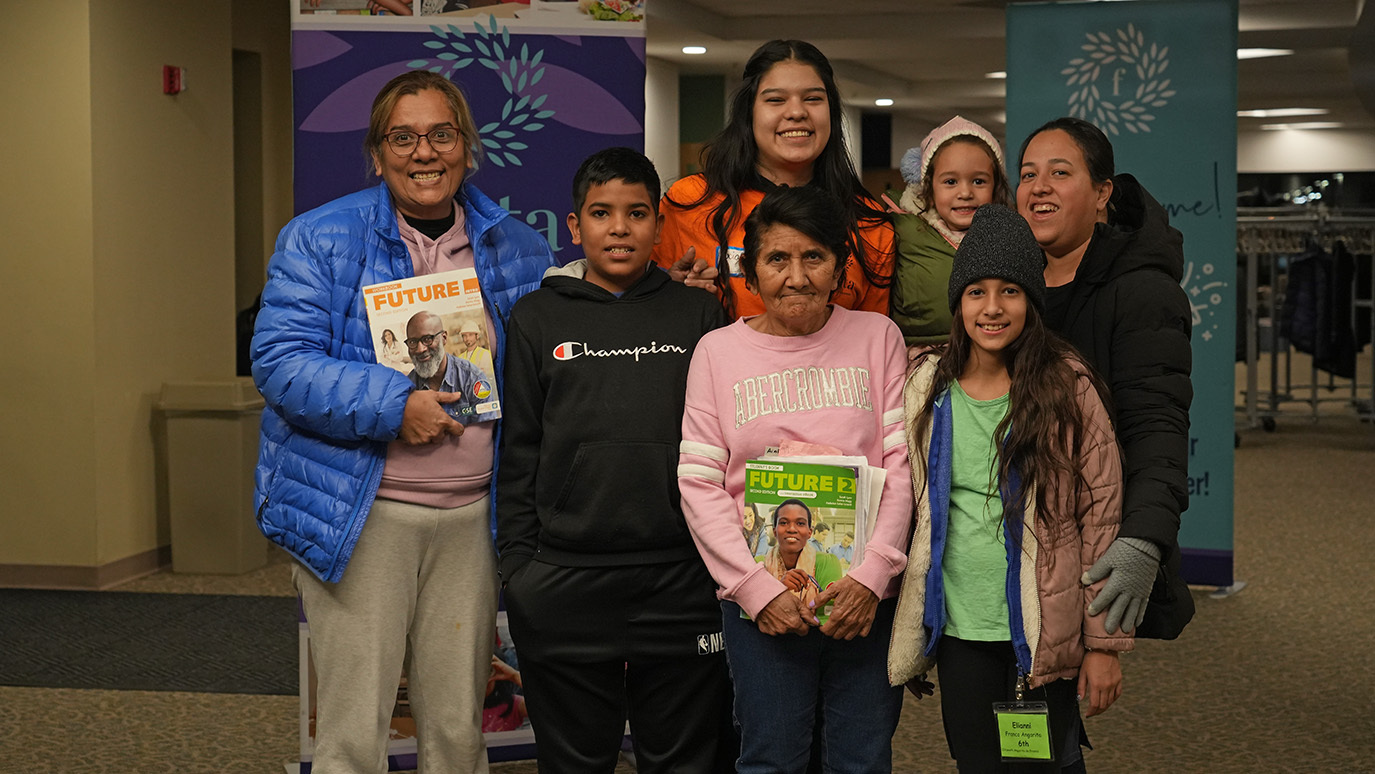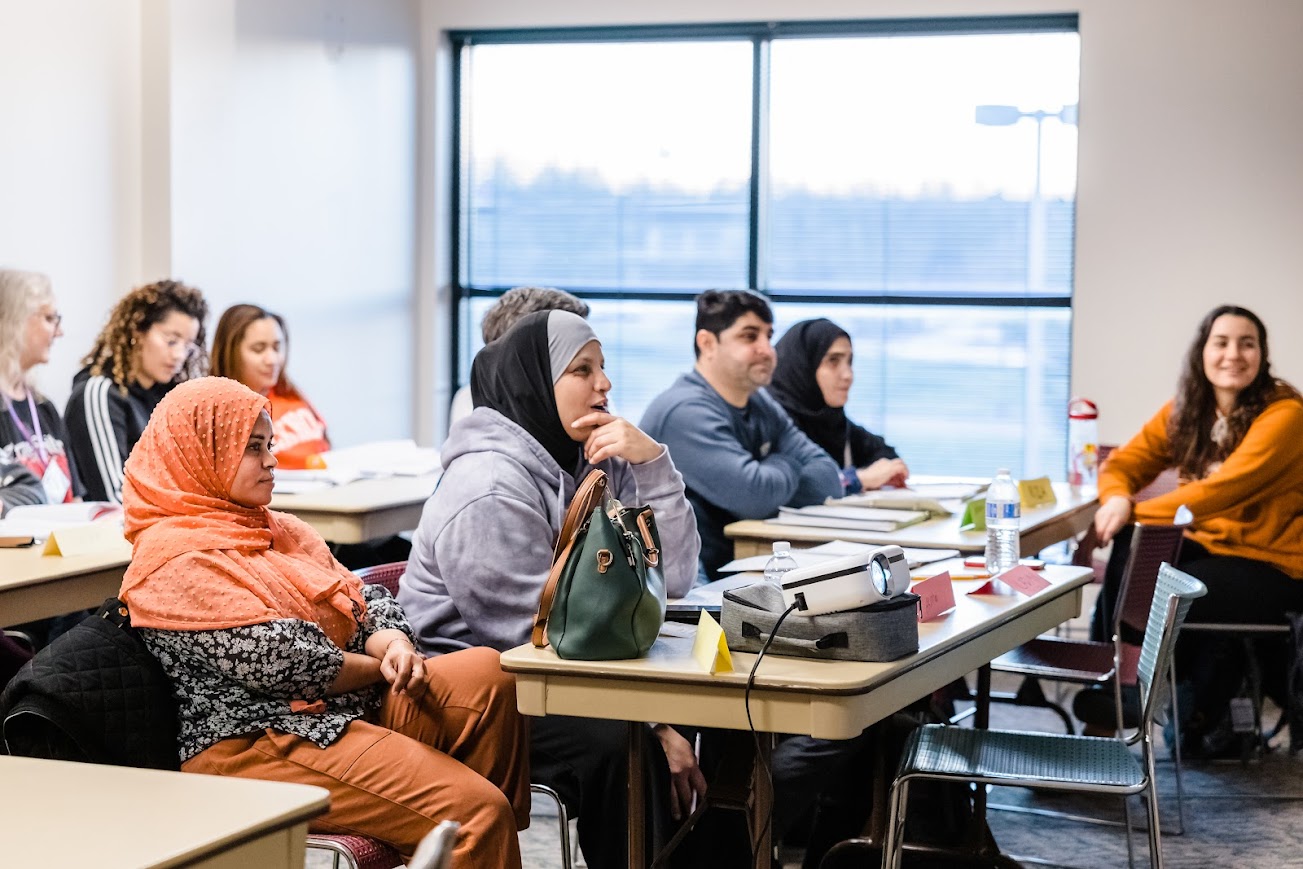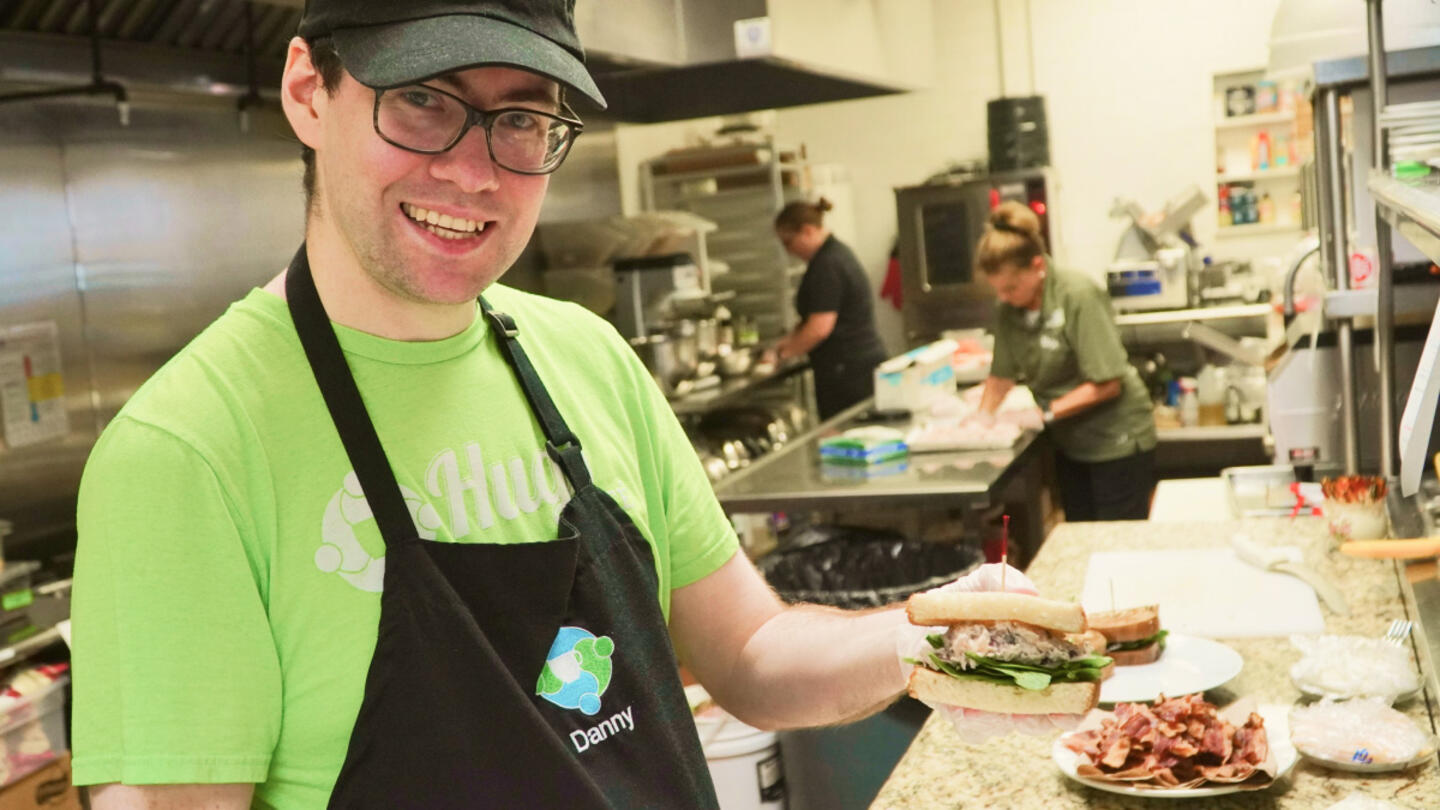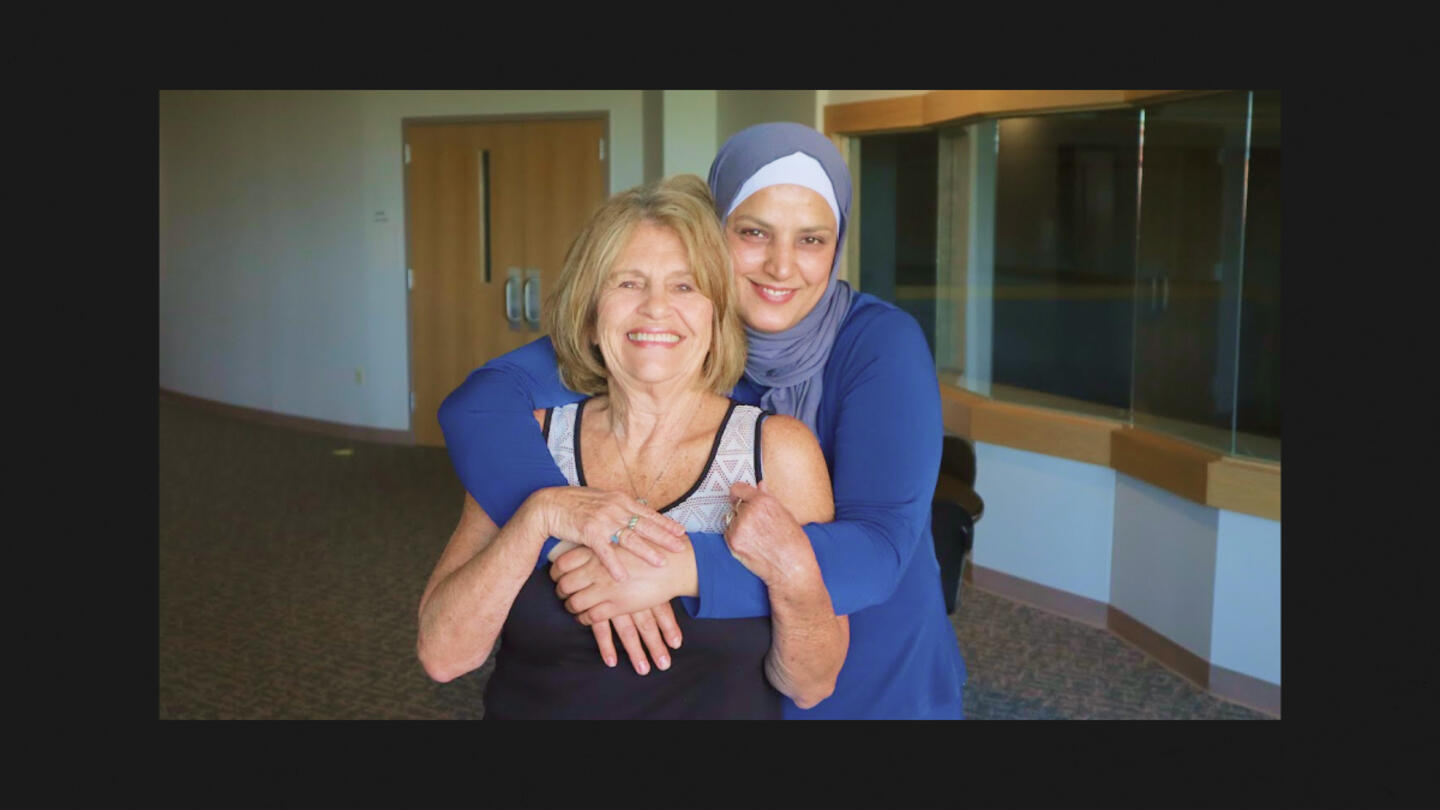Nine years ago, when Asma Al Asmar first arrived in the United States after growing up in Jordan, she was afraid of what she’d heard about the country. For a year, she barely left her new home — until a neighbor made all the difference.
After that time in isolation and loneliness, Asma learned about an organization called Festa from her neighbor. A faith-based nonprofit in central Ohio, Festa is dedicated to helping families break the cycle of poverty through transformative relationships.
“Families tell us that it’s scary,” said Festa founder Kim Emch. “When you’re afraid people won’t understand you, or worse, treat you poorly because of your accent, it’s very scary to feel part of your new community.”
Festa’s flagship service is its 3-Generation Family ESL Program. Every family member — from infant to grandparent — gets the education they need. Parents and grandparents attend adult English classes while school-age children play or do homework, and younger children attend preschool. Asma can bring her children so that while she’s learning English, they are getting dinner and the support they need on homework.

In her Festa English class, Asma met Joyce Gericke, a volunteer teacher assistant. The two became friends, and now they are “family” with “an unbreakable bond,” as Joyce puts it. She helps Asma navigate life outside her home — things like doctor’s visits, grocery shopping, and helping with her three children, who call her “Grandma Joyce.”
Asma and Joyce’s story exemplifies the heart of Festa’s mission: to break down the isolating barriers facing many immigrants who don’t speak English and bring them into a community where they can thrive and contribute.
Learning English is part of it. An even bigger part? Building life-changing relationships and creating a sense of belonging — across all lines of difference.
Which is worse for your health: loneliness or smoking? It’s a toss-up.
Just how concerned should we be about loneliness?
Sign up for the Strong & Safe Communities newsletter for stories, ideas, and advice from changemakers working with their neighbors to address the biggest problems we face.
“The surgeon general in the United States has pronounced an epidemic of loneliness,” said Emch. “When I was growing up in the 1970s and 80s, it was an epidemic of smoking. It turns out the health issues are just as critical with loneliness.”
The warning from the surgeon general pertained to the general U.S. population, but immigrants who don’t speak English are particularly at risk for loneliness. In addition to adjusting to a new culture, not speaking the language makes everything harder. “Understanding the American culture, the education system, the health care system, the transportation system, the legal system — every single thing is different,” said Kim. “You go to the grocery store, every label of every food looks different. It’s overwhelming, scary, and exhausting — and it feels lonely.”
But it’s even more than that. Many immigrants come to the United States as refugees who have left everything — even family members — behind.
Joyce recounted the story of an Afghan family that was separated during the 2021 bombing at the Kabul airport as the Taliban took control of the government. After the attack, only those inside the security fence were allowed to board flights out of the country. This couple found themselves outside the boundary — but their toddler daughter was inside with her grandparents and aunt.
“Those parents could not get inside to their daughter,” said Joyce. “So she came to America with the grandparents. To this day, the little girl only knows her parents and siblings on FaceTime.”
Family separation is common. Asma has two adult sons who are still living in Jordan because they haven’t been able to secure visas.
Emch has been particularly struck by “the emotional pain of missing your loved ones, your children, your parents. Sometimes, there’s a death in the family, and the person is overseas, so they never get to say goodbye. It’s heart-wrenching.”
That year of isolation was hard for Asma.
“I closed the door,” Asma said. “I stayed home, and it almost made me crazy. I need an open door. I need to go outside.”
The opportunity to go to Festa for English classes with simultaneous programming for her children has been life-changing. It’s not just that Asma speaks better English. At Festa, she has found a place to belong. With 1,000 participants from 89 countries and more than 1,000 volunteers, Festa is a place where immigrants can find belonging and build relationships with many different people.
Kim emphasized that Festa’s community benefits volunteers as much as it does immigrants.
“It’s not just immigrants who are lonely,” she said. “Many Americans are, too. We — Festa employees and volunteers — need this community as much as immigrants do to cure our loneliness, build community, and make friends across lines of difference with people from around the globe.”

Last year, 80% of adult students in Festa’s English classes said they felt more connected to their communities.
Asma would tell you her English still needs work, but when she goes to Festa, she is surrounded by encouragement — and she’s no longer afraid to speak in English.
“We create a space where people from across the globe come together and build relationships with each other,” said Emch.
A striking line of difference
After Joyce and Asma’s friendship was well established, Asma casually asked Joyce what she would be doing for Christmas that year. Her answer: “Asma, I’m Jewish.”
Asma is from Jordan and Palestine. She was surprised to learn Joyce was Jewish. “She told me, ‘I am Jewish,’” Asma recounted. “‘I said, ‘What?’ ‘I am Jewish.’ I told her, ‘What?’”
“What?” Joyce said. “You don’t love me? Are we not friends?”
“No, no, I love you, and you are a friend,” Asma told her. “But this was a surprise for me. … Joyce is very, very good.”
That was about three years ago, and it still feels like a novel concept for Asma. Such a relationship had not seemed feasible before she met Joyce. “We talk about how there are good people and bad people everywhere and in every walk of life,” said Joyce.
“Adding on top of that, Festa is a Christian faith-based nonprofit,” said Emch. “We feel called by God to love and serve our neighbors — all our neighbors.”
“It’s nondenominational love,” said Joyce.
In the 17 years since Emch founded Festa, hundreds of families and thousands of children have participated. Joyce said the diversity is evident from the moment you enter.
“If you walk into a Festa classroom, you know what’s going on in the world,” said Joyce. “When the Ukraine war started, we had — and still have — an influx of families from Ukraine. When American troops pulled out of Afghanistan, then we had an influx of people from Afghanistan.”
Festa’s community now represents dozens of countries, and Emch feels a deep sense of hope when she thinks about the children involved in the program.
“I believe the children Festa serves will be perfectly suited to deal with the biggest issues in this country, the biggest global issues,” she said. “They can work with people across every line of difference, every kind of difference. They don’t label differences as bad. They’re exciting and good.”
You don’t have to be special to help others. Just walk with them.
Imagine arriving in Jordan without knowing Arabic or anyone who speaks it. Your family consists of you and your three children, all younger than 10. Then, an unexpected medical emergency arises.
What would you do? How would you get to the hospital? Who would care for your children?
That’s almost exactly what happened to Asma a few months ago. Now an employee of Festa, she fainted at work. However, in this real-life scenario, she wasn’t alone. Her Festa community rallied around her, taking care of her children and helping her get home to rest.
Who do you think called when Asma got home? That’s right — Joyce called and was so worried that she took her to the hospital immediately, where Asma was admitted for a week.
Through it all, Joyce and other friends from Festa stayed by Asma’s side, providing emotional support. Asma didn’t have to worry about her children, and Festa staff connected her with resources to help her recover after leaving the hospital until she was back on her feet.
For most of us, it’s exactly what our families would do. For Asma, Joyce and Festa are her family — and Joyce would tell you that it goes both ways.
“Everybody is nice at Festa,” Asma said. “Festa is awesome. And everybody in the group is awesome.”
Emch and her team plan to expand Festa’s reach, starting with its 3-Generation Family ESL Program. The expansion has already started across central Ohio, where adult English classes are scarce. In Columbus, Ohio, the fastest-growing city in the country, only 4% of foreign-born people can find an adult ESL class. There are no other classes that serve the entire family simultaneously.
The goal is to serve between 7,000 and 10,000 people in the Columbus area before extending Festa to major cities throughout the United States.
Big numbers aside, in her many years doing this work, Emch has been struck by the impact one person can have in other lives. “You don’t have to be a special person,” she said. “You can just be a person who sees people in need of support and wants to care about that and walk with them.”
Festa is supported by Stand Together Foundation, which partners with the nation’s most transformative nonprofits to break the cycle of poverty.
Learn more about Stand Together’s efforts to build strong and safe communities and explore ways you can partner with us.

People with disabilities want meaningful work — and Hugs Cafe is making it happen.

At this ‘resort,’ children with intellectual disabilities are seen as gifts to be celebrated and loved.

Veterans experience loss when leaving service. Could this be key to understanding their mental health?

The Grammy-nominated artist is highlighting the stories we don’t get to hear every day.
